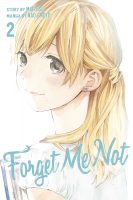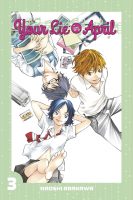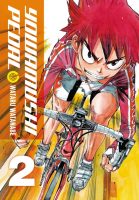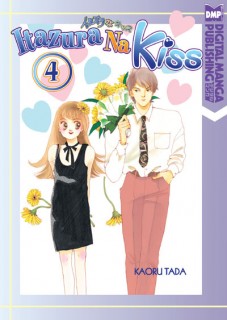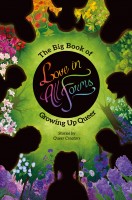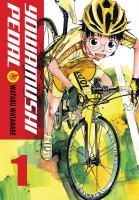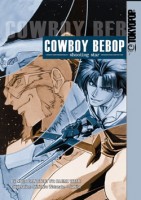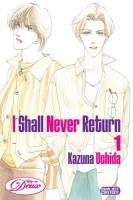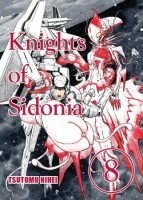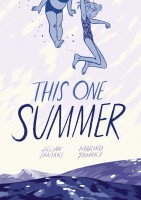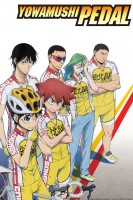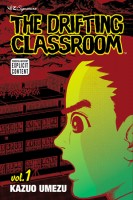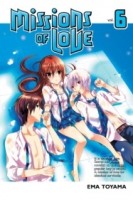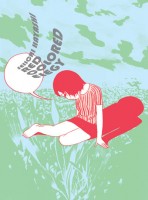My News and Reviews
Nothing other than the usual My Week in Manga feature was posted last week at Experiments in Manga. However, I still have a few things in store before the year is through. Later this week you’ll want to be on the lookout for the monthly manga giveaway for December. I’ve also been hard at work on my list of notable manga, comics, and other books that I’ve read that were released in 2016. That list should be ready to post in the very near future as well!
Quick Takes
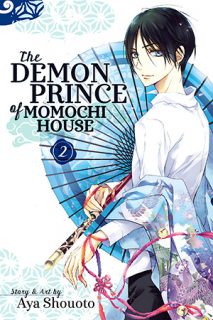 The Demon Prince of Momochi House, Volumes 2-6 by Aya Shouoto. It was the beautiful artwork and yokai that first drew The Demon Prince of Momochi House to my attention and that continues to be a large part of the series’ appeal for me. I’m also enjoying the story’s melancholic atmosphere as the manga explores themes of loneliness and the desire to belong. Himari, who is an incredibly sweet and caring person, is steadily building her relationships and friendships with the locals, ayakashi and humans alike. However, more the romantic elements of the series are admittedly less convincing. Although there is an underlying story about the mysteries surrounding Aoi and Himari’s efforts to free him from his tragic fate, The Demon Prince of Momochi House frequently almost seems episodic in nature as Himari is introduced to a variety of supernatural wonders and dangers. The seemingly directionless and less-than-cohesive storytelling can be frustrating and sometimes even feels a little shallow, but overall I find the series to be alluring and provocative and look forward to reading more.
The Demon Prince of Momochi House, Volumes 2-6 by Aya Shouoto. It was the beautiful artwork and yokai that first drew The Demon Prince of Momochi House to my attention and that continues to be a large part of the series’ appeal for me. I’m also enjoying the story’s melancholic atmosphere as the manga explores themes of loneliness and the desire to belong. Himari, who is an incredibly sweet and caring person, is steadily building her relationships and friendships with the locals, ayakashi and humans alike. However, more the romantic elements of the series are admittedly less convincing. Although there is an underlying story about the mysteries surrounding Aoi and Himari’s efforts to free him from his tragic fate, The Demon Prince of Momochi House frequently almost seems episodic in nature as Himari is introduced to a variety of supernatural wonders and dangers. The seemingly directionless and less-than-cohesive storytelling can be frustrating and sometimes even feels a little shallow, but overall I find the series to be alluring and provocative and look forward to reading more.
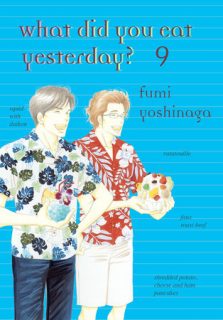 What Did You Eat Yesterday?, Volumes 9-11 by Fumi Yoshinaga. I am incredibly happy that What Did You Eat Yesterday? is being released in English, so it makes me sad that the series doesn’t seem to be doing especially well in translation. It’s a shame, because it really is a wonderful manga. While I certainly appreciate the food aspects of What Did You Eat Yesterday?, I particularly love the realistic and nuanced characterizations found in the series. The food is all well and good, not to mention beautifully illustrated, but it’s the characters and their relationships that really make the series work. Shiro’s character development has probably been the most interesting and satisfying. I’m very glad to see his relationship with his parents improving even after some significant setbacks. While he’s still not out in his professional life, it is clear that he is becoming more comfortable publicly expressing his sexuality. Fortunately, Shiro and his long-term boyfriend Kenji have the love, support, and acceptance of others which makes that easier. More recently, rather than their homosexuality, what they’ve had to worry about are Shiro’s aging parents and the rising cost of living.
What Did You Eat Yesterday?, Volumes 9-11 by Fumi Yoshinaga. I am incredibly happy that What Did You Eat Yesterday? is being released in English, so it makes me sad that the series doesn’t seem to be doing especially well in translation. It’s a shame, because it really is a wonderful manga. While I certainly appreciate the food aspects of What Did You Eat Yesterday?, I particularly love the realistic and nuanced characterizations found in the series. The food is all well and good, not to mention beautifully illustrated, but it’s the characters and their relationships that really make the series work. Shiro’s character development has probably been the most interesting and satisfying. I’m very glad to see his relationship with his parents improving even after some significant setbacks. While he’s still not out in his professional life, it is clear that he is becoming more comfortable publicly expressing his sexuality. Fortunately, Shiro and his long-term boyfriend Kenji have the love, support, and acceptance of others which makes that easier. More recently, rather than their homosexuality, what they’ve had to worry about are Shiro’s aging parents and the rising cost of living.
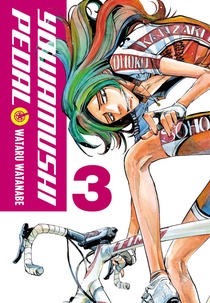 Yowamushi Pedal, Omnibuses 3-4 (equivalent to Volumes 5-8) by Wataru Watanabe. Out of the recent spate of new sports manga being released in North America, Yowamushi Pedal is currently one of my favorites. I have seen a fair amount of the anime adaptation so at this point I am very familiar with where the plot is heading, but even so I still find the original manga to be immensely engaging. Before Yowamushi Pedal, I actually didn’t realize how much of a team effort cycling could be; it’s interesting to learn about the various strategies that can be used to win a race. These couple of omnibuses largely focus on Sohoku’s intensive training camp and also introduce some of the major competition. The characters are fun, some of them are frankly pretty cool, too, and they all have distinctive personalities. The Sohoku team especially is made up of a group of quirky but likeable and talented young cyclists. Art-wise Yowamushi Pedal could almost be described as ugly, but I really like its highly dramatic and energetic style. Watanabe probably uses more speedlines than any other artist I’ve seen, but the effect is great.
Yowamushi Pedal, Omnibuses 3-4 (equivalent to Volumes 5-8) by Wataru Watanabe. Out of the recent spate of new sports manga being released in North America, Yowamushi Pedal is currently one of my favorites. I have seen a fair amount of the anime adaptation so at this point I am very familiar with where the plot is heading, but even so I still find the original manga to be immensely engaging. Before Yowamushi Pedal, I actually didn’t realize how much of a team effort cycling could be; it’s interesting to learn about the various strategies that can be used to win a race. These couple of omnibuses largely focus on Sohoku’s intensive training camp and also introduce some of the major competition. The characters are fun, some of them are frankly pretty cool, too, and they all have distinctive personalities. The Sohoku team especially is made up of a group of quirky but likeable and talented young cyclists. Art-wise Yowamushi Pedal could almost be described as ugly, but I really like its highly dramatic and energetic style. Watanabe probably uses more speedlines than any other artist I’ve seen, but the effect is great.
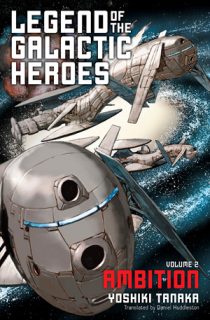 Legend of the Galactic Heroes, Volumes 2-3 by Yoshiki Tanaka. Despite the nearly constant war and political upheaval present in the Legend of the Galactic Heroes novels, the series isn’t really that action-oriented. I suspect some people will actually find it to be rather dry and perhaps even textbook-like. With only the occasional bout of melodrama, the series quickly moves from one event or venue to the next and the cast of characters only continues to grow. (Granted, as this is war, not all of them survive very long after being introduced.) Because the scope is so sprawling sometimes it feels as though Legend of the Galactic Heroes lacks depth of story and characters, instead opting for a wider view and summary of major events. However, Tanaka does show how the complexities of societal, political, economic, and militaristic influences can impact one another. The books frequently read like a popular history, and the series actually reminds me a bit of Romance of the Three Kingdoms, too. So far I’m really enjoying the series and find its story and characters interesting. I like the focus on tactics and strategy as well as the influence that real-life history has had on the series.
Legend of the Galactic Heroes, Volumes 2-3 by Yoshiki Tanaka. Despite the nearly constant war and political upheaval present in the Legend of the Galactic Heroes novels, the series isn’t really that action-oriented. I suspect some people will actually find it to be rather dry and perhaps even textbook-like. With only the occasional bout of melodrama, the series quickly moves from one event or venue to the next and the cast of characters only continues to grow. (Granted, as this is war, not all of them survive very long after being introduced.) Because the scope is so sprawling sometimes it feels as though Legend of the Galactic Heroes lacks depth of story and characters, instead opting for a wider view and summary of major events. However, Tanaka does show how the complexities of societal, political, economic, and militaristic influences can impact one another. The books frequently read like a popular history, and the series actually reminds me a bit of Romance of the Three Kingdoms, too. So far I’m really enjoying the series and find its story and characters interesting. I like the focus on tactics and strategy as well as the influence that real-life history has had on the series.
